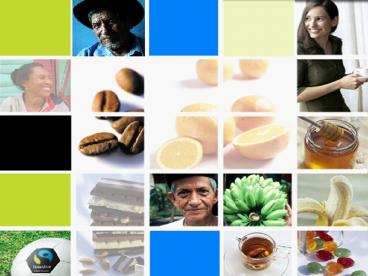FAIRTRADE LABELLING ORGANISATION PowerPoint PPT Presentation
1 / 20
Title: FAIRTRADE LABELLING ORGANISATION
1
(No Transcript)
2
FAIRTRADE LABELLING ORGANISATION FAIRTRADE
CERTIFIED HONEY
PASCASIE NYIRANDEGE PBU LIAISON OFFICER FOR
UGANDA/RWANDA FLO INTERNATIONAL BONNER TALWEG
177 53129 BONN GERMANY
11.10.2006
3
FLO
- THE PRINCIPLES
- THE MISSION
- THE SYSTEM
4
Labelled Fairtrade the basic principles
- The basis of FLOs activities is Fair Trade,
defined as - a trading partnership, based on dialogue,
transparency and respect, that seeks greater
equity in international trade. It contributes to
sustainable development by offering better
trading conditions to, and securing the rights
of, marginalized producers and workers
especially in the South. - Central values partnership, dialogue,
transparency, accountability, respect,
(gender-)equity, sustainability
5
FLO International
- The Mission
- To enable development empowerment of
disadvantaged producers workers by - a) setting international FairTrade standards
- b) certifying production and trade according
to international FairTrade standards - c) developing FairTrade markets through
national FT labeling organisations - d) providing producer support
- e) promoting the FT-approach in debates on trade
and development
6
National Initiatives (20)
NI
NI
NI
NI
NI
NI
NI
NI
NI
NI
NI
NI
NI
NI
Canada USA Mexico
NI
NI
NI
NI
Japan
NI
Austria, Belgium, Denmark, Finland, France,
Germany, Ireland, Italy, Luxemburg, Netherlands,
Norway, Spain Sweden, Switzerland, UK
NI
Australia New Zealand
7
Fairtrade Labelling System
8
FLOs structure
National Initiatives
9
FAIRTRADE STANDARDS
- DEFINED
- CATEGORIES
10
Defining Fairtrade Standards
- Social Standards
- Small farmers / Hired labour
- Generic / Product specific
- Minimum requirements / Progress requirements
- Economic / Trade Standards
- Generic (not for trade yet) / Product specific
- Minimum Price and FT-Premium
- Pre-financing
- Medium/long term commitment
- Environmental Standards
- Generic / Product specific
11
FLO has different standards for three different
Fairtrade situations
- Standards for small farmer organisations, who
cultivate their land (Smallholder Standards) - Standards for companies, which are dependent on
hired workers (Hired Labour Standards) - Standards for small and unorganised cotton or
rice farmers, who cultivate their land or have
some hired workers (Contract Production
Standards)
12
Defining Fairtrade Standards
- Product specific standards
- Bananas (HL), Cocoa, Coffee, Dried Fruit, Fresh
Fruit (HL), Honey, Juices, Nuts and oil seeds,
Quinoa, Rice, Herbs and spices, Sugar, Tea (HL),
Wine (HL) - Cotton, Flowers (HL), Sportsballs (HL)
13
Certification Process
Producer Application
FLO Cert
Scope Check whether producer fits to system
Yes 1. Questionnaire 2. Invoice 3. Inspection
Visit
No Refusal of Application
Inspection Visit
On site inspection field visit, office check,
writing of report
FLO Cert
Inspection Report 2. opinion
Inspection Report
Certification Committee
Information on Certification Decision
Producer
Appeals Committee
Producer can object against decision
Final Certification Decision
14
FAIRTRADE CERTIFIED HONEY
- PARTNERS IN HONEY TRADE
- FAIRTRADE HONEY PRICE
- ORIGIN OF FT HONEY
- TRENDS
15
Partners in Honey trade
- 26 Certified producer organisations 13 in
Mexico, 4 in Chile, 5 in Guatemala, 2 in
Nicaragua, 1 in Argentina,1 in Zambia - 3 Registered exporters (1 in Chile and 1 in
Mexico,1 Nicaragua) - 29 Registered Traders in the UK (6), Germany
(6), Switzerland (4), France (4), Italy (4),
Belgium (3), the Netherlands (1) and Japan (1).
16
FT Honey Price
- New FLO price since December 2005
- 1,800 USD/Mt min. price for A quality
- 1,650 USD/Mt min. price for B quality
- 150 USD/Mt Fairtrade premium
- 150 USD/Mt for organic certified honey
When Market Price gt Fairtrade Min Price FLO Min
price Market price Fairtrade premium
17
(No Transcript)
18
Trends
- FT market niche and stable
- Since 2002, high price situation
- August 2004, some price stabilisation with
Chinese honey back into the market - Origins most demanded Mexico, Chile, Guatemala
- Main markets Switzerland, Germany
- Sales as final product and to the industry.
- Challenges
- Competition with domestically produced honey
- High quality standards required by law
- Trade barriers on exports (Africa)- EU list of
authorised import countries - Niche market
- Demand for non-organic Fairtrade honey
- For producer group Producing enough quantity for
export. - Opportunities
- Demand for organic fairtrade honey
- Markets with potential increase France, Belgium,
Italy, Scandinavian Countries - Potential new markets catering, cosmetic,
industry.
19
A GROWTH IN FAIRTRADE LABELLED HONEY IN COMING
YEARS IS EXPECTED
- FLO producer support network is planning to work
on new projects that could help Fairtrade honey
producers export the right quality for the
European retail market.
20
More information available
- info_at_fairtrade.net.
- http//www.fairtrade.net/sites/standards/standards
.html - www.flo-cert. net
- Certification_at_flo-cert.net

